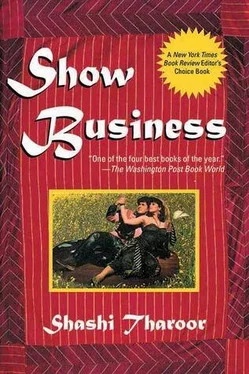Once at a party in Delhi I met a girl called Malini who said she knew you before you joined the movies. Rather nice girl, really — she’s involved in some sort of street theater movement, bringing culture to the masses, but not pretentious at all about it, very committed in fact. She gave me the impression that she’d been close to you; she said wryly that she’d tried to dissuade you from going to Bombay because she was afraid you wouldn’t make it there. (She laughed about that so charmingly that I caught a glimpse of the kind of person she must be — passionately caring but modest — and I marveled at your luck in finding them every time.) It was clear, as much from what she didn’t say as what she did, that you meant a lot to her — and that you had at least given her the impression at one time that she meant a lot to you.
Anyway, you know what she said? Mildly, not complaining, but with a tone of regret that I thought masked some stronger feeling. She said that once you left Delhi you made not the slightest effort to contact her ever again. She said she was so sure you would that she kept making excuses for you — that you were having a very rough time in the early days, that you were waiting to be a success before you got back in touch, et cetera. Of course, you didn’t write or call, and she realized, as so many before and since have realized, that she wasn’t as important to you as she thought she’d been. But it took some time for this to sink in — how much we all like to deceive ourselves, Ashok-bhai, about you!
She decided to take the initiative herself. At first she had no idea how or where to contact you, and then you had a couple of hits and your Bombay address started popping up in the magazines, at least the name of your bungalow and the rough area it was in. So she wrote to you — a simple, direct, personal letter saying how happy she was about your success, bringing you up to date on her own life, and expressing hope that you could meet on. your next visit to Delhi. She got in return, three months later, a printed postcard with your picture on the back, a standard fan mail response typed on the other side, and an autograph she knew wasn’t really yours — because she has your real signature, you see, on the program or brochure of a play you had done together. You can imagine how she felt. I could: she didn’t have to tell me, and to her credit, she didn’t even try.
I told her about your Sponerwalla and your Subramanyam, and how her letter probably never even got to you, but what excuses can you make for such a thing? The very fact that you hire and keep a secretary who can do something like that shows how little you care, how unimportant these things are to you. How unimportant people are to you. People don’t really matter to you, Ashok-bhai; they never have. With no exceptions: not Dad, not Ma, not me, not even your kids, and certainly not Maya. Least of all, I’m sure, these Mehnaz Elahis of yours or the Malinis of the past. It wouldn’t surprise me if you ended every relationship the way you ended the one with Malini, without a good-bye. Why bother to take the trouble to say farewell when you don’t really care if the other person fares well or not?
I’m sorry, Ashok-bhai. I suppose everyone who comes in here and talks to you says all sorts of pleasant and cheerful and affectionate things to buck you up and help you reemerge into our world, whereas here I am, needlessly wounding you. And yet who has better right than me, after growing up in your shadow all these years, doing all the things you rejected, and finally watching the biggest prize of my life fall easily into your lap when it was at last within my reach? Don’t get me wrong, Ashok-bhai, I’m not bitter. I’ve never been bitter about you, just accepting. You were there from the day I was born, you were part of my firmament, like the sun and the moon and the stars, and the things you did or that happened to you were as ineffable, as unsusceptible to change, as the movement of the planets. I reacted to you, but I never presumed to think I could do anything about you. You simply were, and I adjusted my life accordingly. So you hit the ball into the neighbor’s when you didn’t feel like bowling to me, and yet a few weeks later there I’d be, bowling to you again. I discovered early that, in relation to you, free will was always an illusion.
Why am I sounding so negative? You know I hero-worshiped you, Ashok-bhai. How could I not have? You were such an admirable figure in my eyes: tall and handsome, good at sports, a very public personality from an early age with your theater and your speech contests and your girls on either arm. I derived so much of my identity from being your brother, it was inevitable that you could do no wrong in my eyes. All this — this criticism came much later, when, after years of being out of your shadow’s reach, I saw you again at close quarters and realized what you were. Saw also that you couldn’t help being what you are, but that didn’t make it any easier to live with.
What a waste your political career was, Ashok-bhai. Why did you do it? Dad understood all along, of course: you stood with no other thought than that you could win. Very useful for the party: by winning in your constituency you helped them deflect the threat of Sugriva Sharma. You served a very specific purpose. But did you think for a minute that they might have another purpose in mind? Did you even think who the “they” were, what the forces were within the party, how the factions stacked up, who had it in for whom, whose interests you might have served by winning, who wanted you out of the way the moment you’d fulfilled your purpose? Did you bother to do any of your homework, make political alliances, pay homage to the mentor you needed, or even acquire an adviser? No, Ashok-bhai. You thought you could go through the political world the way you did the film world, picking up scripts designed for you, doing what came naturally and reaping the benefits. It didn’t work that way, after all, did it? And if you had only asked me, I could have told you it wouldn’t; I would have saved you all the frustration, the humiliation, the waste. And in the process I could have prevented you from destroying Dad’s political legacy and my political hopes.
It was that Swiss bank thing that really pissed me off. Why? Why did you need it? You wandered into politics and assumed the prevailing mores, but just as you did in films, you assumed the worst of them. There are actors in Bollywood who pay their taxes, surely, and there are, even if it sounds like an oxymoron, honest politicians. But you, Ashok-bhai, with your languid eye on the main chance, you would never have sought to be either. How was it that you never learned anything from Dad?
I’m sorry. I’ll change the topic, promise. But what can we talk about, Ashok-bhai? You’re about all we have in common. Politics? No, I’ve said too much already. Films? What do I know about films? I took Dad to see that film you made in the first flush of political enthusiasm, Mechanic. Your first real failure after Dil Ek Qila. There it was, your statement of purpose, your cinematic attempt to promote your political image with the masses. And what crap it was, Ashok-bhai! Dad squirmed in embarrassment throughout, and I, your ex-campaign manager, didn’t know which way to look.
Of course, Dad kept objecting to all the wrong things. A real-life Pranay would never support slum demolitions, he pointed out. In fact, he argued, the slums exist because of the Pranays, who give these areas political protection by making populist speeches about squatters’ rights and who thereby assure themselves of both the votes of the grateful slum-dwellers and the financial support of the mafia dons who really run the slums and who collect extortionate rents for a few square feet of public property. Not only that, no politician would conduct himself in an election year the way your Pranay does: even if he stood to gain from slum demolition, he would surely pretend otherwise rather than lose such an enormous bloc of votes. When the slum delegation goes to him, he would at least promise to “look into it” or “see what I can do” — utter some such time-honored insincerity. But your movie has him behaving with all the overweening arrogance of the Hindi film villain.
Читать дальше












